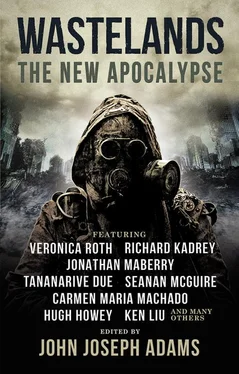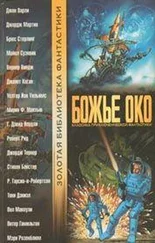Gossamer. That’s what holds us together.
* * *
When my Maru got sick, she went back to her village to get better. The phone and supply ships made it feel like I could reach her when the time was right. Now there is no word. My wife of forty-one years is beyond my reach.
The grandchildren ask if she’s okay. Even though we’re the ones who’ve run out of sugar and flour. I sit on the reef and gaze toward Suva.
What else can I do?
* * *
I saw the sail first.
The white cloth like a towering wave that refused to break. It grew bigger, and I paddled back to the village to let them know that tourists were coming again. This was before I knew better. We can’t call them tourists, the ones who arrive here now.
Refugees is the word.
Survivors.
It’s been almost a year since the last supply ship. No one knows why, and we’ve lost the ability to go see for ourselves. No one remembers how to sail or navigate. We only go to islands we can see—never over the horizon. And we ran out of petrol for the Yamahas months ago.
We paddle to fish these days. Old canoes made of hollowed trees were pulled from the woods and found to still float. They’re easier to maneuver by paddle than the fiberglass longboats made in New Zealand. One of the old longboats we used to fight over now sits upturned on the beach, thrown there by a storm, and nobody has bothered to right it. It’s no good without the motor.
Oh, but the first white sail on the horizon in more than a year! A sail full of hope. Finally, some kind of contact. I roused the village and we gathered on the shore as the small boat steered through the passage. The rattle of chain and the splash of anchor, and we waded out with happy hearts to receive them and ask if the world has forgotten us, if our children send word, what is going on in Suva.
A German man, gaunt and grizzled, fell from the boat and collapsed into my arms. He was starving, he said. He looked mostly dead, ribs like furrows plowed into the soil, all bones, like someone who belonged in a cave. Every heart in the village broke in that moment, and I’m ashamed to say it wasn’t for him that we were crushed. It was for ourselves.
The man spoke little English, but we made enough of his gibberish to know fear for the first time. He spoke of a world without power, a world where machines went haywire. Some say the machines did it themselves and some say it was crazy people who broke the machines on purpose. A world where bombs had become machines with their own minds and clouds of ash covered entire continents. We listened beneath blue skies, on our little green island surrounded by sea and fish, and some walked away rather than believe, and I wasn’t sure what to make of it.
The man said even in Suva people had gone crazy fighting over scraps. The big city only ever had a week of supplies at a time. A week. Big ships from New Zealand came with great containers. A week!
Even we planned for longer. The man said his wife had been murdered. I could hear the wind in the caves. I thought of my sweet Maru and part of me knew she was gone. An emptiness grew inside me. An urge to scream that I hadn’t felt since I was a boy.
* * *
Our neighbors from Ogea Levu have started a small settlement on the south coast of our island, abandoning their ancient homes to be nearer to us and our lagoon of fish.
There’s much discussion about this. In Fiji, everything belongs to someone. Every coconut is owned. We have a rite here of sevusevu where we seek permission to visit someone else’s land. Kava is presented; we drink together; and permission is always granted. Of course we welcomed our neighbors. Because we didn’t think that they would stay .
The German’s name is Klaus, and he and I have become friends. He is a terrible fisherman, but getting better. I marveled that a man who lives on a boat couldn’t take fish from the sea more easily. He marveled that a man who lives on an island doesn’t know how to sail from one to another.
Gossamer. We snip threads without seeing them.
I taught him to fish, and he taught me how to sail his little boat around the lagoon so we didn’t have to paddle. He and his wife had left Germany many years ago to see the world together. All he talks about is her, and all I talk about is my two girls. Klaus and I both speak of recent things like they are in the far past, and sometimes the words are hard to get out.
I don’t ask much about Suva. I don’t tell him about my wife. I fear the worst.
* * *
A French family was the next to arrive. They came in a catamaran. They’d been living up in Namuka with the villagers there, but said one day the chief came and told them sevusevu was no more. They had to go.
Rumor is that one of their sons was thinking of taking a wife and that this had started an argument. They were bringing back the old ways on Namuka. Shedding their clothes and going back to carrying spears and smearing mud on their faces. Praying to the wrong gods. I think this French family might’ve been lucky to get away with their lives.
One day, I found the young French boy sitting on a rock peering north like he’d left something over the horizon. I knew that look. A hand on his shoulder was all I had to offer.
Clouds of birds dove into the sea out beyond the reef, emerging with flashes of silver on their beaks. We watched the gulls fish and everything seemed so simple if you could forget most of what you knew.
In the weeks that followed, the boy and I began sailing together on Klaus’s boat. We didn’t talk much. We practiced our smiles.
Nobody had touched the longboat for enough months that I decided I could have it. I set it up on the beach behind my house, pushing and tugging with ropes over bamboo rollers, not asking anyone for help because I had to do it myself. And here is where I found my ancestors—not in any cave, or in any religion old or new, but on the beach, fixing a keel to a boat that had never known one, building a rudder where a Yamaha motor had once been, making a mast out of a tree and sails from bedding and laundry.
It was difficult to get to our island, because the trade winds blow without fail. But leaving here would be easy. The wind at my back. It must be how my people first arrived. There must’ve been someone like me who either thought the world was going crazy, or maybe this was the crazy place and it might be better out there if we just go see for ourselves.
And anyway isn’t the wind calling and the sea full of fish?
Klaus and Emanuel took turns visiting my project and offering gestures of advice. Klaus loaned me some old ropes. Emanuel brought a small can of paint and a brush and said I had to name her. I slept on this and the next morning I painted Gossamer on her stern.
Out there, somewhere, the world was going to hell. But I was getting better.
* * *
I think my brother was the first to know what I was planning. He stopped making fun of my project after I named the boat. He brought me his favorite lure and helped me clean two dozen coconuts for the journey. We husked without much talking. He tried to give me his knife. I hugged him and could smell our father on us both.
I pushed off the next morning with the sun low. Emanuel came in tears and begged me to take him, to drop him off at Namuka on the way, but I knew he wouldn’t be welcome there and that his parents would miss him. But it was painful to deny a man who wants something that badly. He was my brother in that moment.
Outside the reef, the wind was stronger than I expected. Ropes creaked, and the boat lurched to the side, and I nearly went over the rail and imagined swimming back to shore ashamed and beaten. But the rigging held, and so did I.
Читать дальше


![Nick Cracknell - The Quiet Apocalypse [= Island Zero]](/books/28041/nick-cracknell-the-quiet-apocalypse-island-zero-thumb.webp)









